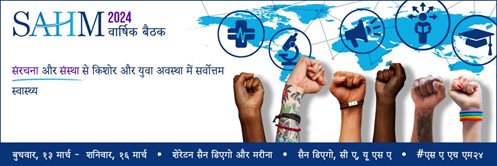Annual Meeting News

 Annual Meeting Update
Annual Meeting Update

By Kari Harris, MD
Director of Programs
and
Chinwe Efuribe, MD, MPH
Associate Director of Programs
Hello again, SAHM colleagues,
We are seven months out from our next conference in sunny San Diego! I know many of us have waited for San Diego for several years and we are doing everything we can to plan another amazing annual meeting. With the 2024 theme of structure and agency in mind, we asked some colleagues from around the globe to weigh in on what those words mean to them. In this newsletter you will hear from Dr. Preeti Galagali, an adolescent health specialist and pediatrician practicing in Bengaluru, India where she has lived for over three decades. She is actively involved in various national and international projects for educating youth, gatekeepers and healthcare professionals regarding adolescent care and well-being. Dr. Galagali also serves as the director for the Bengaluru Adolescent Care and Counseling Centre. Below Dr. Galagali reflects on structure and agency as it relates to global adolescents and young adults (AYAs).
Currently, the earth is home to 1.8 billion AYAs. They comprise 16% of the global population. Their health determines the health of the world, today and tomorrow. It is imperative to enhance AYA agency and ensure availability of enabling and nurturing structures to achieve the global sustainable development goals (SDGs) and attain universal health coverage (UHC). Agency and resilience are essential components of the adolescent well-being framework.
Agency is the ability to set goals without coercion, have self-belief, and the power to act to attain these. Structures include the existing rules and resources that influence actions and thereby AYA agency. For example, an adolescent with obesity belonging to a low economic stratum, who taps into his agency and decides to approach a doctor to attain the goal of good health, but then retracts his decision to do so due to lack of confidential, non-stigmatizing and economical adolescent health services in the community. Agency and structure are interdependent.
Multiple factors influence agency and structure: parents, teachers, peers, culture, religious and societal norms, healthcare professionals, nonprofit and governmental agencies, and national and international policies. Collaborations between these multiple stakeholders and AYAs play a major role in designing effective (age, developmentally and culturally appropriate) programs to promote positive youth development and hence agency: at home, in schools and in the community at large. Collective AYA agency ensures that their voices are heard in designing youth-friendly structures, changing discriminatory and stigmatizing societal norms and developing innovations to build a healthy planet and world that they will eventually inherit and inhabit! Vulnerable and marginalised youth, those with intellectual disability, neurodevelopmental disorders, chronic medical disorders, living in childcare institutions, armed conflict areas and in poverty, juveniles, LGBTQ, orphans and those facing natural disasters due to climate changes need specialised programs to build agency and structure.
Healthcare professionals serving the AYA population are knowledgeable about the developmental trajectory and challenges to their well-being. They are in a unique position to meaningfully engage with AYAs, strengthen their agency and lead a ‘call for action’ through multi agency collaboration for appropriate structures through research, clinical care, advocacy and education.
We are grateful to Dr. Galagali for contributing such an eloquently written essay.
We will conclude this section with a few conference notes. The call for proposals is now open for submissions. Please submit your proposals for workshops, institutes, SIGs and research abstracts here. You will notice the submission system is different this year as the previous system is no longer available. If you have any questions or concerns when submitting, please email info@adolescenthealth.org. Please note that while we intend to have a limited virtual package available for those who cannot attend the annual meeting in person, we expect all speakers to present in person. Keep this in mind when submitting proposals. If you have an equity-related barrier to presenting in person, please contact info@adolescenthealth.org prior to submitting a proposal.
Lastly, we want to thank all 100 members of the program committee for their service in planning the annual meeting. We cannot do this without you!

